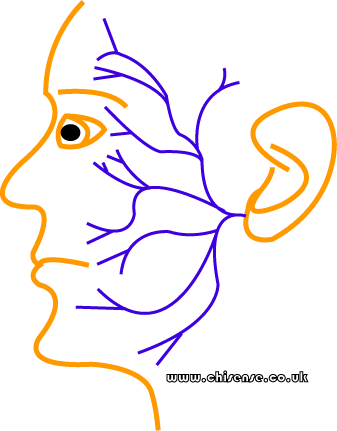Bell’s Palsy or Facial Palsy is mostly unilateral facial nerve paralysis. Bell’s Palsy or Facial Palsy rarely happens to both sides of the face. Palsy can come on very suddenly. The facial nerve paralysis usually reaches its peak within one day.
Bell’s Palsy or Facial Palsy symptoms:
- Face: facial muscle paralysis, facial expression is out of control, forehead wrinkles disappear.
- Eye: eyelid sagging, difficult to close eye, watery eye, dry eye, eyelid twitching trembling, hard to frown.
- Nose: trembling in nose and cheek.
- Mouth: the corner of mouth drops, twitching, and saliva dribble out of mouth.
Ear: pain underneath the ear.
- Recovery: Most people start to recover within a couple of weeks and have completely recovered within three months. Some people who develop Bell’s palsy require a longer recovery period or retain some permanent symptoms of the condition.
TCM diagnosis:
Traditional Chinese Medicine uses the name Facial Palsy for Bell’s Palsy, and believes that Facial Palsy is caused by external factors as well as internal organ weakness. There are three main causes of Facial Palsy or Bell’s Palsy: Wind attacks the internal organs, Dampness and phlegm silts up meridians and Chi(Qi) and blood deficiency.
We give acupuncture therapy according to the patient’s symptoms and observation-based diagnosis. Most of the time, some other Traditional Chinese Medicine therapies such as Fire Cupping therapy, Guasha therapy, Moxibustion, Acupressure massage, can combine together with acupuncture to attain a more effective result.
Acupuncture or Fire Cupping therapy, Guasha, Moxibustion, Acupressure Massage, all aim to ease toxin away from internal organs and increase blood and Chi (Qi) flowing energy, and nourish the body meridians too.
From working with various Bell’s Palsy clients, I have observed some trends. For example, the number of male patients is higher than female patients. Clients generally have symptoms more or less as follows: fatigue, tired, anxiety, nervous, depression, emotional, cold etc. Alcohol can also be one of the trigger factors for Facial nerve palsy.
Note – as with all health concerns you should consult your GP or local health professional in the first instance.
Home care advice:
No cold raw meals, no oily spicy foods, no smoking, no alcohol, no hard-to-digest foods;
Eat fresh food, more vegetables, grain and beans;
Get enough sleep! Reduce TV watching, computer use etc;
Do facial exercises.
Keep away from, or keep wrapped up from, wind and rain.